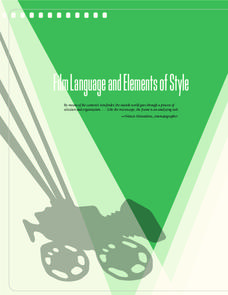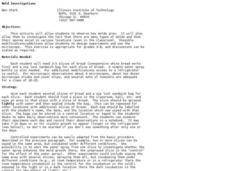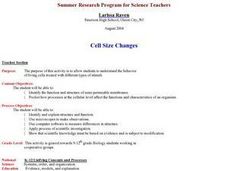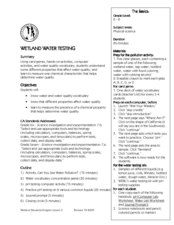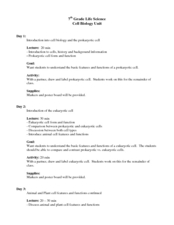Film Foundation
Film Language and Elements of Style
How do you read a frame? How do you read a shot? Here's a resource that shows viewers how to read films. As part of the study, class members examine the camera angles, lighting, movement, and cinematic point of view in Mr. Smith Goes to...
Curated OER
The Gift of Life - Day 2: "Cell & Organelle Time to Tell" and "World in Color" (Chapters 2-4)
Students complete a cell biology lesson and a color lesson based on The Giver. In this biology and reading comprehension lesson set, students examine cells using microscopes. They look at the organelles and listen to How Much is a...
Curated OER
Naked to the Eye
Students understand that microorganisms are too small to see but there are other indications they exist. In this microorganisms lesson, students recognize that some microorganism are helpful and some are not. Students use a microscope to...
Curated OER
What's Outside the Cell Membrane ?
Students examine the cell coats (matrix) of chondrocytes and fibroblasts and observe these cells actively exclude particles which are released around them. They observe the function of the cell membrane as a gatekeeper as it prevents...
Curated OER
Animal Organs and the Study of Reproduction, Embryology and Cancer
Students examine organs from dogs and cats to study reproduction, embryology, and the identification of cancer. They record their observations at both the gross and microscopic levels. They present their information to the class.
Curated OER
Salt: Up Close and Personal
Learners predict, observe, and explain the details of salt as they view it under a variety of magnifications. They observe salt with the naked eye, and then under a hand lens, microscope, and the electron microscope.
Curated OER
Mold Investigations
Students observe mold growth on bread. In this mold growth lesson, students place bread in various locations and in various conditions to investigate how location, moisture, temperature, and other variable impact the growth of mold on...
Curated OER
Cell Size Changes
High schoolers examine the behavior of living cells treated with different types of stimuli. They watch an online movie, examine wet mount slides under a microscope, take an online quiz, and analyze data.
Curated OER
Particulate Matter
Seventh graders examine the different types of pollutants. In this environmental science lesson, 7th graders observe particulate matter under a microscope. They explain how these can affect once health when breathed in large quantities...
Curated OER
The Parts of a Perfect Flower
Students explore the parts of a flower. In this flower structures lesson plan, students study a model of a flower and dissect a flower. They label each structure of the flower and observe the pollen grains and ovules under the dissecting...
Curated OER
Seed Sorting
Students examine and sort seeds. In this life science lesson, students make general observations of a tub of seeds, then develop sorting criteria for sorting the deeds. Lesson includes extension activities.
Curated OER
Wetland Water Testing
Students examine the different properties that affect water quality. In this pollution lesson plan students play a game, complete a hands on activity and computer lab.
Curated OER
Seed Dispersal
Students determine seed dispersal methods. For this life science lesson, students make predictions about how seeds might move, then look at seeds under micrographs or microscopes to analyze the seed coat and how this helps dispersal. ...
Curated OER
Blood Circulation Lab
Students investigate blood moving in the fin of a fish. In this blood circulation instructional activity, students use a goldfish wrapped in water soaked absorbent cotton, placed in a large petri dish, then placed until a lighted...
Curated OER
Life Cycle: Diversity in a Balance 4th Grade Workbook
In this life cycle workbook, 5th graders examine plant and animal cells, classification of organisms, human biology, photosynthesis, and natural environments. 21 different activities make up the Life Cycle Workbook.
Curated OER
Cell (Biology)
High schoolers conduct a series of activities to explore the nature of cells. In this biology lesson, students observe plant and animal cells under the microscope and compare them. They differentiate osmosis and diffusion.
Curated OER
Life Cycle: Diversity in a Balance
In this life cycle workbook, 3rd graders complete several different activities in which they analyze different invertebrates, identify arthropods, examine human biology and plants, and study natural environments. 20 different activities...
Curated OER
Flower Power
Students explore the parts of flowers and how they reproduce. They dissect flowers and observe the reproductive organs. Students observe anthers and ovaries of Tiger Lilies under a microscope. They investigate how insects and other...
Curated OER
Classification of an Invertebrate: Sponge
Students investigate the invertebrate sponge. In this invertebrates lesson plan, students observe the sponge, Grantia, using a dissecting microscope. Students answer questions about their observations and view six other invertebrates....
Curated OER
Using Magnetotactic Bacteria to Study Natural Selection
High schoolers observe bacteria that are able to orient themselves using the Earth's magnetic field.They comprehend the difference between anaerobic and aerobic organisms. Students can tell the difference of the shape of magnetic force...
Curated OER
Extreme Flashlight Tag
Fifth graders view a Powerpoint show about reflecting light. They experiment through a reflection simulation on the internet. Students complete the activity by using mirrors and light to complete send light to a specified spot.
Curated OER
Sea Urchin Embryology
Young scholars explore the process of evolution. They examine examples of how homeotic genes may work and obtain gametes. Using a microscope, students observe the fertilization of sea urchins. They video tape the process and write a...
Curated OER
Taking Estimation and Measurement Outside
Eighth graders gain a better understanding of visual distances and estimation. They actively practice using metric measurement and conversion. Students practice cooperative exploring and team building.
Curated OER
The Science of Microbes
Students will explore cells to understand that all living things are composed of cells. In this science lesson, students use the scientific process and work in cooperative groups to gain a better...
